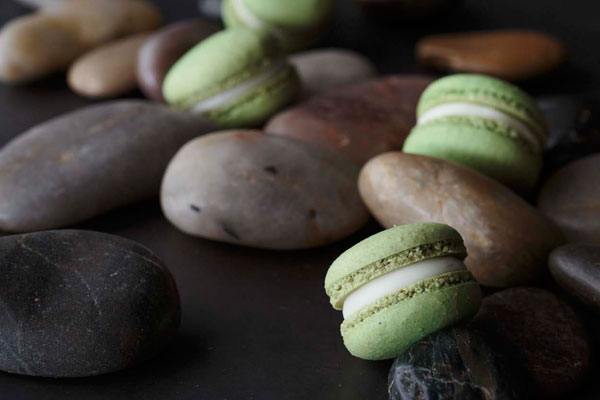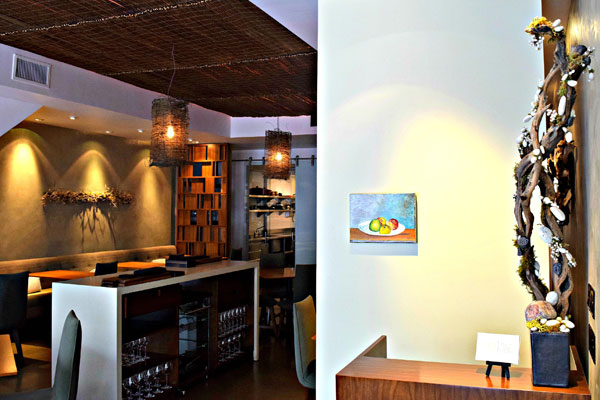Header: chef Dominique Crenn and two dishes called The Sea
The recently launched 50 Best BBVA Scholarship will see a bright aspiring cook embark on two stages, first at Mugaritz with chef Andoni Luis Aduriz, then at Atelier Crenn with Dominique Crenn.
Voted as The World’s Best Female Chef in 2016, French chef Crenn honed her culinary skills in many different restaurants, cities and continents before settling down in San Francisco to open Atelier Crenn, where her ‘Poetic Culinaria’ cuisine is highly acclaimed. Here, she tells us about her learnings from those formative years, how to make the most of every kitchen and what mentoring means to her.
Learning to cook should come from the heart. You can learn the techniques and the skills, but if you're not a true cook at heart, you will never be a great chef.
At some point in your career it's important to work with someone you admire and you want to learn from. As you try to understand their mind and the way they cook, you need to put yourself in a mindset where every day is a learning experience.
The best thing you can do is see what you’re learning as a gift, to be humble and appreciative. I look at everything in my life as a gift. Sometimes the gift is bitter, sometimes it’s sweet, but it's always a gift to be able to learn something new.
When I started cooking I didn't do any stages, I started working right away because I needed to pay the bills. I approached chef Jeremiah Tower because I loved his restaurant Stars in San Francisco. I told him: "I'm French, I know how to cook, can you take me under your wing?" I knew it was going to be hard, but did it anyway.
At Stars, every day I had to create three or four dishes on my own. I would get to the restaurant and receive the menu that had been written the night before with the ingredients available. Then I would go to my cooking station and produce three or four dishes from the menu. The dishes were often given with guidelines, but never with a recipe.
It was up to you to understand what the chef wanted. A few hours later, the sous chefs would come around and taste the food. If they didn't like it, you only had half an hour to fix it.
Cedar macarons
Thanks to that experience, I became very proactive. When I was given the menu, I would make sure to ask for help with anything I wasn’t sure about. That's very important because sometimes in kitchens there is so much pride. Young cooks don't want to show that they don’t know how to do something.
Being vulnerable is a strength. To be able to go out there and say: “You want me to do an hollandaise sauce and I think I know how to do it, but can you walk me through it so I don't make any mistakes?” That's very important.
After Stars, I worked in other restaurants in San Francisco before moving to Jakarta in Indonesia for a period, then to Los Angeles. A crucial thing I learnt was how to work with others. It’s necessary to respect others' points of view. I never treated anyone as competition.
Teamwork is the first thing that every cook should learn. I saw every kitchen I worked in as a team. To me, to be part of that team is to understand others and to be able to work with them.
I remember that at the time I told myself: "One day, I will create a space." I didn’t just want to open a restaurant, I wanted to create a space where I could bring everything that I had learned and where people could feel safe, creative and happy to come to work.
Atelier Crenn's dining room (image: Mika Takeuchi)
To an aspiring female chef I would say that nothing in life is easy, so she needs to believe in herself and focus on the direction of her cooking. Does she want to do modern cuisine? Or maybe work with nature, or with history, or just do something casual? She needs to understand how she wants to describe herself. When she knows that, then she can go to work at a restaurant where she can learn about it.
Be confident. Believe in yourself. It's all about determination, dedication and passion, but you have to put yourself out there, work very hard and be determined that you can do anything you want. Everything is possible in life.
When I work with young people, the quality I like to see the most is that they care – especially about humanity, the team and the ingredients. When I interview them, I don't really care about their CV. I like to sit down with them for an hour or so and just talk to them. I want to know who they are as a person.
The way you see life influences how you cook. There is a lot of responsibility that comes with cooking. You are feeding people, but you are also dealing with others, the planet and the producers. If you lie to people when you're cooking and you pretend to be someone you’re not, you lose your authenticity.
Having weaknesses is a skill in itself because from them you can learn about yourself and you can turn them into strengths. That’s what I often tell my stagiaires.
Mentoring is about inspiring, teaching and listening. I hope that the people who work with me can learn a lot. I want to inspire them, but I am also very much inspired by them because they come to the table with a fresh point of view and their own unique life experiences.
The 50 Best BBVA Scholarship means a lot to me because it's very humbling to be given the chance to take someone under your wing. It's also part of my life journey because mentoring comes naturally to me. Six weeks can give a stagiaire a window into Atelier Crenn and I hope they can take away something positive. I hope we can help them on their journey through life.
Applications to the 50 Best BBVA Scholarship are open until Monday 5th February to chefs with less than three years’ experience in a professional kitchen. Apply now on the Scholarship portal.
Stay tuned to our Facebook, Instagram and Twitter channels for the latest 50 Best news and subscribe to our YouTube channel for videos.

